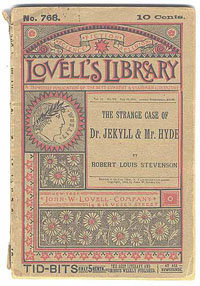Strange Case of Dr Jekyll and Mr Hyde, 1886

Summary
Dr Jekyll and Mr Hyde opens with a lawyer named Mr Utterson taking his weekly walk with Mr Enfield. Along the way, they pass by a “blistered and distained” (p. 229) door.
Enfield tells Utterson that he had once passed the same door late at night and saw a man “trampl[e] calmly over [a] child’s body” (p. 229). Enfield and other witnesses demanded the man, Edward Hyde, pay a large sum of money to the child’s family. Hyde passed through the door and returned with a cheque drawn on the account of Dr Henry Jekyll, a respected physician. Enfield assumed Hyde had obtained the money by blackmailing Jekyll, and he and Utterson agree to say no more about the affair.
Enfield’s story, though, concerns Utterson. Jekyll is both a friend and a client, and Utterson knows that Hyde is connected in some mysterious way with Jekyll. In fact, in the event of his death or disappearance for more than three months, Jekyll has willed all his possessions to Hyde.
Utterson decides to wait for Hyde to appear. When he sees him, Utterson is instinctively repulsed by what he feels is Hyde’s deep deformity. Soon after, Jekyll assures Utterson he can rid himself of Hyde whenever he pleases.
Almost a year passes without incident. One night, however, a maid sees Hyde bludgeon Sir Danvers Carew to death with a walking stick that Utterson had given as a gift to Jekyll. The attack was so ferocious that the stick broke in two, with one half left in the gutter. Utterson takes the police to Hyde’s rooms, where they find the other half of the walking stick and evidence that Hyde has fled and burned many of his papers.
When Utterson confronts Jekyll, his friend insists no one will ever see Hyde again. He also gives Utterson a letter from Hyde stating as much. However, when Utterson’s clerk, Mr Guest, a handwriting expert, examines the letter, the writing is confirmed as Jekyll’s. Utterson cannot understand why Jekyll would forge for a murderer. But as more time passes and it seems Hyde has truly disappeared, Utterson relaxes and he and their mutual friend Dr Lanyon frequently enjoy Jekyll’s company.
Suddenly, however, Jekyll withdraws to his home and refuses to see anyone. When Utterson visits Lanyon to discuss this change, he sees that Lanyon has received a terrible shock and is near death. Lanyon dies soon after, and Utterson receives an envelope from him marked “not to be opened till the death or disappearance of Dr Henry Jekyll” (p. 259).
As the story builds to a climax, Jekyll’s butler, Poole, hurries to Utterson and begs him to come to Jekyll’s house. He believes Hyde has killed Jekyll. Poole says that Hyde has been locked in Jekyll’s study, ordering Poole to get supplies from chemists all over London. Utterson and Poole rush over, break in, and find Hyde’s twitching body – he had committed suicide when he heard them forcing the door.
Utterson and Poole search but can find no trace of Jekyll. All they have are a sealed letter from Jekyll and a will bequeathing his estate to Utterson.
Utterson first reads Lanyon’s letter. It reveals that Jekyll begged him to come to his house, break open the study, retrieve a drawer and its contents, return home, and wait for Hyde’s arrival. The drawer contained “a phial of some tincture, a paper of some salt, and a record of a series of experiments” (p. 279). Lanyon obeyed and, when Hyde arrived, he mixed the tincture and salt, drank it, and was transformed into Jekyll. Lanyon knew the shock of seeing this event would kill him.
Utterson then turns to Jekyll’s letter. It reveals that Jekyll had long been fascinated by the “thorough and primitive duality of man” (p. 285). He experimented with dividing the self until he discovered a potion that would turn him into evil Mr Hyde. Taking the same solution a second time would restore him to good Dr Jekyll.
At first, Jekyll delighted in the freedom to indulge in sin as Hyde. Soon, though, he felt deep remorse. Hyde, however, became harder and harder to throw off. Eventually, Jekyll accidentally began turning into Hyde, even without the potion. Meanwhile, the supply of the salt needed as a vital ingredient of the transforming potion was almost gone and no more could be found. Jekyll concluded that the original salt must have contained an impurity that brought about his transformation. Having taking the final draught, Jekyll wrote as Jekyll for the last time, expressing his hope that Hyde would have “the courage to release himself at the last moment” (p. 32).
Quotations from Strange Case of Dr Jekyll and Mr Hyde, The Works of Robert Louis Stevenson, Swanston edn, vol v (London: Chatto and Windus, 1911).
Image courtesy of Rare Books and Special Collections, Thomas Cooper Library, University of South Carolina
Note on pronunciation: Stevenson pointed out that the surname of the protagonist should be pronounced ‘Jeekill’.
